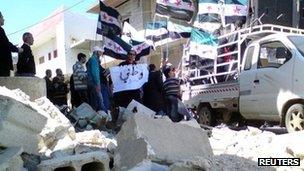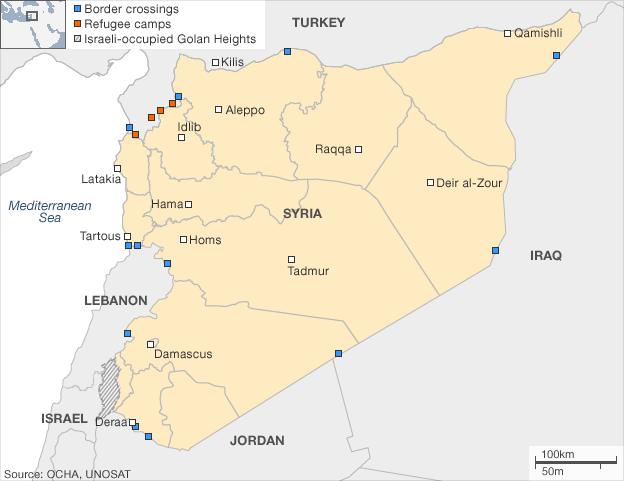Syria ceasefire: UN expected to vote on monitor team
- Published
The BBC's Jim Muir says there are fears the truce "could easily unravel"
The UN Security Council is set to hold a vote on a resolution authorising the initial deployment of monitors to Syria to oversee the ceasefire there.
A draft text was finalised on Friday. Russia has said that it is satisfied with the revised text and that it is prepared to vote in favour.
A truce has generally held in Syria since it began on Thursday, but both sides have alleged breaches.
Syria's opposition says troops shelled parts of the city of Homs overnight.
And on Saturday activists accused Syrian security forces of opening fire at a funeral in Syria's second city of Aleppo, killing four and injuring dozens.
State TV blamed rebel gunmen firing at random and accused the opposition of trying to derail the peace plan.
State media also accused armed rebels of killing at least three security officers in different parts of the country.
One person was said to have died in the shelling of Homs, reportedly the first fatality in the restive city since the ceasefire.
Activist video showed mortars and tank shells hitting parts of Homs, especially the Qarabis quarter, from shortly after prayers on Friday.
The BBC's Jim Muir in Beirut says the shelling in Homs is an alarming lapse in the fragile ceasefire.
But the intensity of the bombardment is nothing like the levels reached in the weeks before the truce, when dozens of people were killed or injured every day, our correspondent says.
UN-Arab League envoy Kofi Annan has called for an advance monitoring team to be deployed immediately to ensure compliance with his peace plan.
Mr Annan's plan aims to end over a year of violence in Syria which has killed over 9,000 people, mostly civilians.
'Very tough'
In New York, efforts to draft a text were hindered by disagreements between Russia and the US, which prevented a vote on Friday.
Diplomats revised a US-proposed draft on Friday to accommodate Russian objections.

UN envoy Kofi Annan wants monitors on the ground as soon as possible
The text was to be sent to governments for approval overnight, and a vote is now expected at 11:00 local time (15:00 GMT) on Saturday.
"There was a negotiation, there is not yet an agreement," French UN Ambassador Gerard Araud told reporters. "It's very tough, but there will be a vote in any case."
US ambassador to the UN Susan Rice said it "would be wise not to make predictions" on the outcome.
The resolution calls for the deployment of an advance team of 30 monitors. Additional approval will be required to increase the deployment to 250, the total which Mr Annan is seeking.
A spokesman for Mr Annan has said that a small group of observers is ready to leave for Syria as soon as a resolution is passed.
"At the moment we have the advance team standing by to board planes and to get there, to get themselves on the ground as soon as possible," Ahmad Fawzi said.
Earlier, President Barack Obama authorised an increase in US aid for Syria's "non-violent, political opposition", including communications equipment and medical supplies, officials said.
Lower casualties
Prayers on Friday were seen as a major test for the truce. Several deaths were reported as thousands of protesters poured out of mosques and took to the streets across the country in fresh revolt against President Bashar al-Assad.
Activists reported that the number of demonstrations nationwide - more than 750 - was higher than on any Friday since the revolt began 13 months ago.
The opposition said security forces fired into the air in many places to prevent or disperse protests. But in others, protesters were killed by gunfire.
But our correspondent says the overall casualty figures for Friday were very much lower than many had feared.
In general, he says, the ceasefire has brought a sharp drop in the level of violence and deaths but, with troops, tanks and heavy weaponry still deployed in and around population centres, it is still very fragile and there are many ways in which it could unravel.
